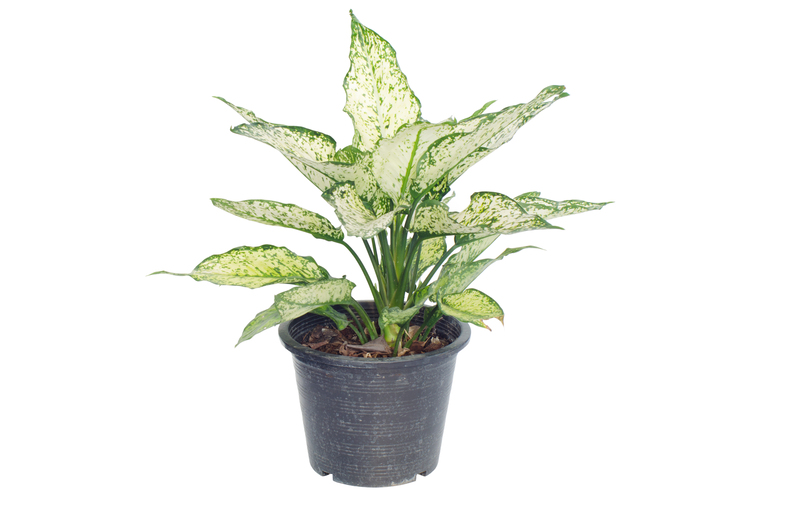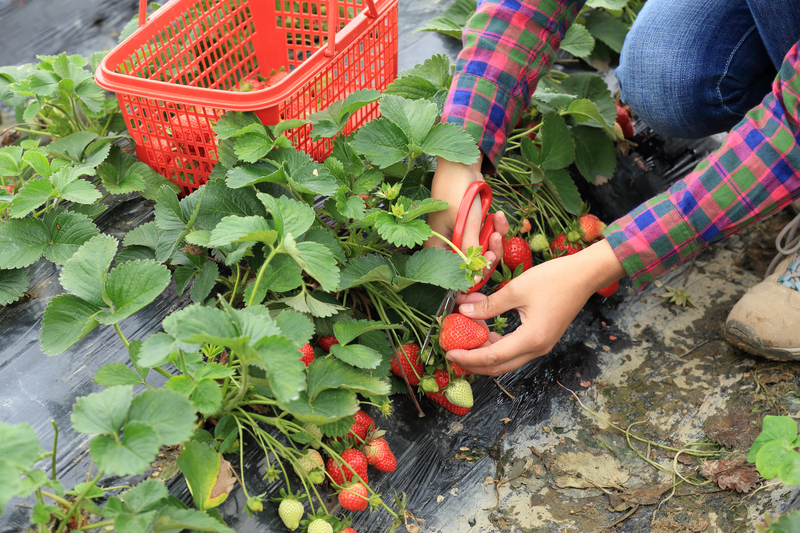Garden Greatness: Three Easy Weed Control Tips
Posted on 02/07/2025
Garden Greatness: Three Easy Weed Control Tips
Maintaining a healthy and flourishing garden can be a challenge, especially when pesky weeds threaten to overrun your hard work. Weeds compete with your prized plants for sunlight, nutrients, and water, often taking over your garden beds if left unchecked. To achieve true garden greatness, it's crucial to understand and implement effective weed control strategies. Luckily, you don't need to spend countless hours or money to keep your garden weed-free.
In this comprehensive guide, we'll explore three easy weed control tips that can transform your outdoor space. Whether you're a seasoned horticulturist or a gardening novice, these simple and proven methods will help you manage weeds effectively--and set the stage for vibrant blooms and healthy produce. Read on for the best ways to enjoy a weed-free garden!

Why Is Weed Control Important for Gardeners?
Before we delve into the specific strategies, it's important to understand why weed control is not just a cosmetic issue. Here are a few key reasons why every gardener should make weed prevention a priority:
- Competition for Resources: Weeds absorb essential nutrients, sunlight, and moisture--meaning your flowers and crops may not get what they need to thrive.
- Habitat for Pests and Diseases: Many weeds harbor insects or promote fungal growth, putting your beloved plants at risk.
- Unsightly Appearance: Even the most carefully curated garden can look neglected when overrun with unwanted plants.
- Spread of Invasives: Some weed species--like bindweed or Japanese knotweed--can quickly get out of control and crowd out native plants.
With so much at stake, learning how to control weeds in your garden--quickly and efficiently--is the key to landscape success. Now, let's get started with three actionable tips you can implement this season.
Tip 1: Apply Mulch for Effective Weed Suppression
Mulching is a gardener's best friend when it comes to organic weed control. By applying a layer of mulch around your plants, you prevent sunlight from reaching weed seeds, some of which need light to germinate. Mulch also helps retain soil moisture, regulate temperature, and enhance soil health--benefiting your garden in countless ways.
What Types of Mulch Are Best for Weed Suppression?
- Organic Mulch: Straw, wood chips, shredded leaves, bark, and grass clippings nourish the soil as they break down. This is an environmentally friendly option that improves soil structure over time.
- Inorganic Mulch: Landscape fabric, gravel, or black plastic won't decompose, but they can be highly effective in certain situations--like under walkways or in perennial beds.
Apply a 2-4 inch layer of mulch around your plants, taking care not to mound it against stems or trunks (which can lead to rot). Replenish organic mulch yearly, as it gradually decomposes. Not only will mulch make your garden easier to maintain, but it will also hamper weed growth naturally--all while giving your landscape a tidy, professional look.
Mulching Tips for Maximum Weed Control
- Weed First: Always remove existing weeds before spreading your mulch layer, or you may trap viable seeds underneath.
- Go Deep (But Not Too Deep): Too thin a layer will be ineffective, while excess mulch can suffocate roots. Stick to 2-4 inches for best results.
- Combine With Other Barriers: For stubborn spots, lay down newspaper or cardboard under your mulch to further block weed germination.
Mulch is not just a simple weed control method, but also boosts your soil's fertility and structure over time--enhancing the overall greatness of your garden.
Tip 2: Practice Smart Plant Spacing and Dense Planting
One of the easiest ways to naturally limit weeds is to crowd them out by planting closely and utilizing ground cover plants. Densely planted beds leave less space for weeds to take root, and healthy plants will outcompete invaders for nutrients and light. This technique is both effective and eco-friendly.
How to Use Dense Planting for Weed Prevention
- Follow Guidelines: Check seed packets or plant labels for proper spacing--then, where appropriate, reduce the distance slightly to create a more "full" effect.
- Integrate Ground Covers: Add low-growing perennials (like creeping thyme, lamb's ear, or ajuga) that spread quickly and form a living mulch over the soil.
- Interplant Crops: Mix fast-growing, leafy vegetables (e.g., lettuce, spinach) with taller crops to shade soil and stifle weed seedlings in vegetable gardens.
- Stagger Plantings: If you're doing succession planting, avoid bare patches by planting new crops right after harvesting older ones.
Using smart plant density not only prevents weeds naturally, but also creates a lush, abundant look that is the envy of any gardener. Choose aggressive but non-invasive varieties suited to your climate for best results.
Best Plants for Weed Control
- Hostas: Great for shady areas and spread well to cover ground.
- Sweet Woodruff: A fragrant groundcover ideal for suppressing weeds beneath trees and shrubs.
- Marigolds: Not only deter weeds, but also fend off some garden pests.
- Clover: Fixes nitrogen in the soil while outcompeting many weed species.
Consider using a mix of ground covers, perennials, and annuals to ensure year-round coverage. Remember, prevention is always *easier* than removing established weeds!
Tip 3: Master the Art of Hand Weeding and On-Time Removal
Even with the best mulch and planting strategies, some weeds are bound to appear. Timely hand weeding remains one of the most effective, eco-friendly methods for garden weed control. It allows you to target weeds precisely, protect your valuable plants, and maintain control without chemicals.
Best Practices for Hand Weeding
- Weed When Soil Is Damp: Pulling weeds is far easier after a rain or watering session, as the roots slip out more cleanly from moist soil.
- Catch Weeds Early: Pull weeds as soon as you spot them. Younger weeds have smaller root systems and are less likely to reseed.
- Remove the Roots: For perennial weeds, make sure you dig out the entire root system; even a small root fragment can regenerate.
- Use the Right Tools: A narrow trowel, dandelion fork, or hand cultivator can time and strain during your weeding sessions.
Establish a weekly "garden walk" routine, inspecting your beds and removing weeds as soon as they emerge. While hand weeding may seem tedious, treating it as a mindful gardening practice is a wonderful way to connect with your green space--and prevent bigger problems down the line.
Pro Tips for Continued Weed Suppression
- Bag and Dispose: Don't compost weeds that have gone to seed, as this can lead to future outbreaks. Bag them and put them out with yard waste instead.
- Know Your Enemies: Learn the most common local weed species. Some annual weeds are easy to remove; others, like thistle or bindweed, require more persistence.
- Stay Consistent: Frequent, short sessions are more manageable and effective than long, sporadic weeding binges.
Remember, tackling a few weeds each day is much less *overwhelming* than facing a whole yardful at the end of the season!

Bonus: Weed Prevention Through Smart Garden Design
Looking for even more ways to achieve full garden greatness and minimize weeding? Consider how your garden's overall design can help:
- Edge Garden Beds: Use bricks, stones, or metal edging to create a defined barrier against creeping weeds.
- Install Pathways: Gravel, pavers, or thick mulch can suppress weeds on high-traffic garden paths.
- Create Raised Beds: These reduce weed invasion from surrounding soil and can be filled with weed-free mix.
Strategic planning pays dividends, resulting in a garden that is not only beautiful but low-maintenance, with far fewer weed problems over time.
Common Weed Control Myths Debunked
There are many so-called "quick fixes" for weeds, but not all are wise--or safe for your garden. Let's debunk a few myths:
- Myth: Vinegar or Salt Kills All Weeds
- Fact: While household vinegar or salt may damage some small weeds, they can also harm your soil, nearby plants, and beneficial organisms. It's best to stick to proven methods.
- Myth: Boiling Water Is the Answer
- Fact: Hot water can kill annual weeds in cracks or isolated places, but is not practical for garden beds and can hurt wanted plants or roots if not used with care.
- Myth: All Mulches Are Equally Effective
- Fact: Some mulches--like grass clippings from lawns treated with herbicide--can actually introduce contaminants. Choose mulch carefully for the task at hand.
Understanding the science behind weed management helps you avoid mistakes and focus energy where it counts!
Achieve Garden Greatness With These Easy Weed Control Tips
In summary, attaining garden greatness doesn't require backbreaking work or chemical sprays. By using good mulch, smart planting techniques, and timely hand weeding, you'll enjoy more flowers, healthier vegetables, and less time spent battling weeds. Remember to stay proactive: the best weed control is consistent action throughout the growing season.
Let's quickly recap our three easy weed control strategies:
- Mulch generously--block sunlight, preserve moisture, and make your soil richer.
- Plant densely--crowd out weeds by using ground covers and tight plant spacing.
- Hand weed early and often--nipping small weeds in the bud is fast and effective.
By making these practices part of your regular routine, your garden will become more productive, attractive, and a pleasure to maintain. Don't let weeds steal the show--put these weed control tips into action today, and enjoy the lush, vibrant sanctuary you deserve!
Ready to transform your green space? Share these weed control hacks and pass the secret of garden greatness along!
Latest Posts
Crafting a Backyard Sanctuary for Kids' Adventures
Transform Your Home with Beautiful Orchids
Using native plants as a strategy against climate change

